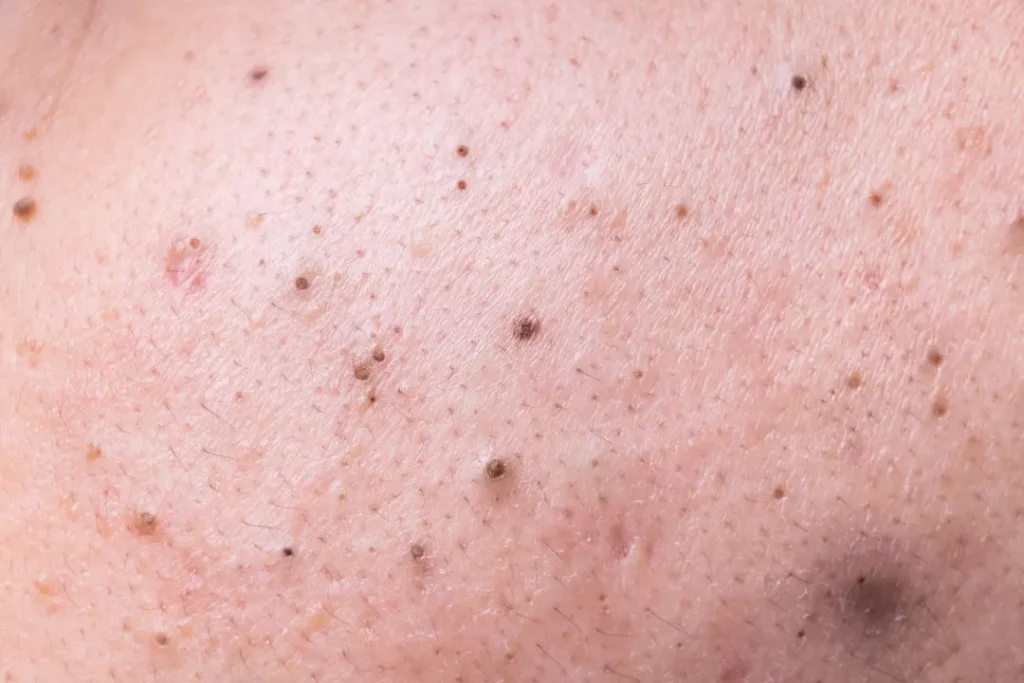Inflammatory skin conditions cast a wide net of discomfort, affecting the lives of countless people across the United States. The burden of these conditions goes far beyond physical discomfort, often impacting self-esteem and overall quality of life. A staggering number of Americans grapple with these conditions, underscoring the urgency of finding effective remedies. According to the American Academy of Dermatology, 84.5 million Americans suffer from skin diseases. That’s about a quarter of the population.
While over-the-counter medications can certainly help, some prefer to use natural supplements to mitigate these ailments. We’ll delve into how krill oil, a well-researched omega-3 supplement, may be able to soothe inflammatory skin conditions.
You May Also Like:
Moringa Oil As A Natural Skin Anti-inflammatory
Unlock the Secret to Thicker Hair: How to Unclog Hair Follicles on Your Scalp
Soothe Inflammatory Skin Conditions with Krill Oil, the Powerful Skincare Remedy is an original (HerHealthWatch) article.
What are inflammatory skin conditions?
Inflammatory skin conditions constitute a diverse group of disorders characterized by the presence of inflammation within the skin tissues. These conditions arise from a complex interplay of genetic predisposition, immune responses, environmental factors, and sometimes underlying health conditions. The common denominator among these conditions is the body’s exaggerated response to triggers, leading to an array of discomforting symptoms.
There are many specific disorders in the realm of inflammatory skin conditions, each presenting unique characteristics. Eczema, or atopic dermatitis, is one of the most prevalent among them. This chronic condition often manifests in the form of itchy, red, and dry patches on the skin. People with eczema may experience skin that is prone to cracking, oozing, and even infection due to constant scratching.
Psoriasis is another significant player in the realm of inflammatory skin conditions. This autoimmune disorder leads to the rapid buildup of skin cells, resulting in raised, scaly patches that are often accompanied by itching and discomfort. Psoriasis can range in severity from mild to severe, with some cases causing joint pain and inflammation, known as psoriatic arthritis.
Acne, predominantly associated with adolescence but also affecting adults, is a well-known inflammatory skin condition. It arises when hair follicles become clogged with oil and dead skin cells, leading to the formation of pimples, blackheads, and whiteheads. While acne is often linked to hormonal changes, its appearance can also be exacerbated by diet, stress, and other factors.
Rosacea, marked by facial redness and visible blood vessels, is yet another inflammatory skin condition that can significantly impact someone’s appearance and self-confidence. People with rosacea might experience episodes of flushing and persistent redness, often accompanied by stinging or burning sensations.
The symptoms of these inflammatory skin conditions can range from mild discomfort to severe distress. Redness, itching, swelling, and pain are common denominators across many of these disorders, underscoring the pronounced impact of inflammation. Traditional treatments often include over-the-counter or prescription medications, topical corticosteroids, antihistamines, and moisturizers tailored to manage symptoms and reduce inflammation. For more severe cases, systemic medications and phototherapy may be recommended.

Krill oil:
A potential solution for inflammatory skin conditions.
Krill oil, a marine-derived supplement, has gained considerable attention for its potential health benefits, particularly in addressing inflammatory skin conditions. Sourced from tiny crustaceans known as krill, these minuscule organisms inhabit the depths of the ocean and serve as a vital part of the marine food chain. Krill oil stands apart from other sources of omega-3 fatty acids, such as fish oil, due to its unique composition and potential advantages.
The omega-3 fatty acids in krill oil, including eicosapentaenoic acid (EPA) and docosahexaenoic acid (DHA), are attached to phospholipids, a type of lipid found in cell membranes. This differs from the triglyceride form in which omega-3s are typically found in fish oil. The presence of phospholipids is significant because they enhance the absorption of omega-3s, allowing them to be more readily taken up by the body’s cells. This unique structure potentially leads to better bioavailability and more efficient utilization of these essential fatty acids.
Omega-3 fatty acids have been widely studied for their anti-inflammatory properties, which make them promising candidates for addressing inflammatory skin conditions. Omega-3s, particularly EPA, have been found to modulate the production of pro-inflammatory cytokines, molecules that play a pivotal role in inflammation. By reducing the production of these molecules, omega-3s may help mitigate the severity of inflammatory responses, thus offering potential relief for those grappling with skin conditions like eczema, psoriasis, and acne.
As research continues to unfold, krill oil’s efficacy in managing inflammatory skin conditions becomes an intriguing prospect. For people seeking a natural approach to complement traditional treatments, krill oil stands as a promising option. By leveraging its distinct composition, rich omega-3 content, and antioxidant properties, krill oil offers a potential pathway to address the root causes of inflammation and provide relief to those affected by inflammatory skin conditions. However, as with any supplement, it’s essential to consult a healthcare professional before incorporating krill oil into one’s regimen, especially if any underlying health conditions are present.

Krill oil supplements
There are many krill oil supplements on the market today and there are options to choose from. However, it is important to look for high-quality products that are effectively absorbed by the body. Kori Krill Oil is a good example of a premium and reputable krill oil company. For those who don’t like taking pills, they offer Omega-3 Gummies as a convenient way to incorporate essential fatty acids into your daily routine.
Kori Krill Oil’s commitment to sustainability extends to the sourcing of its products. The Omega-3 Gummies are carefully crafted from sustainably sourced krill, ensuring both the well-being of consumers and the marine ecosystems from which these valuable nutrients are extracted. Furthermore, their products are third-party tested which ensures that the supplement works effectively and is not detrimental to your health.

Building a comprehensive plan for inflammatory skin conditions.
While krill oil shows promise as a potential ally in managing inflammatory skin conditions, it’s crucial to recognize that it is just one piece of a comprehensive strategy for healthier skin. To truly address these conditions, a holistic approach that encompasses lifestyle and nutritional adjustments is essential.
Diet plays a pivotal role in skin health, and certain dietary choices can either exacerbate or mitigate inflammatory skin conditions. Incorporating a variety of nutrient-rich foods is crucial. Omega-3 fatty acids, such as those found in krill oil, can also be sourced from fatty fish like salmon, chia seeds, flaxseeds, and walnuts. These foods not only offer anti-inflammatory benefits but also provide essential nutrients that support overall skin health.
Antioxidant-rich foods are equally important. A diet rich in colorful fruits and vegetables provides a spectrum of antioxidants that combat free radicals and oxidative stress, both of which contribute to inflammation. Berries, leafy greens, and citrus fruits are excellent choices. Additionally, reducing refined sugars, processed foods, and foods high in saturated fats can help mitigate inflammation and support healthier skin.
Hydration is another vital component of skin health. Drinking plenty of water helps maintain the skin’s moisture balance and supports its natural barrier function. Adequate hydration also assists in flushing out toxins and promoting overall skin vitality.
Lifestyle adjustments also contribute significantly to managing inflammatory skin conditions. Stress management is paramount, as stress can trigger flare-ups and exacerbate inflammation. Engaging in relaxation techniques such as meditation, yoga, or deep breathing can help reduce stress levels.
Sleep is often overlooked but essential for skin health. Poor sleep can disrupt the body’s inflammatory response and exacerbate skin conditions. Prioritize a consistent sleep schedule and create a conducive sleep environment to ensure quality rest.
Finally, maintaining proper skincare practices is integral to an overall strategy. Using gentle cleansers and moisturizers suited for sensitive skin can help manage inflammation. Sun protection is equally vital, as excessive sun exposure can trigger inflammation and worsen skin conditions.
The skin is the largest organ in the human body, so it is of the utmost importance to take good care of it. A combination of supplements such as krill oil paired with healthy diet and lifestyle adjustments is a great strategy to prevent and treat inflammatory skin conditions if they arise.

Further Reading
Medical News Today: Krill oil may be better than fish oil for aging and brain health
Longevity. Technology: How can krill oil help you lose weight
First for Women: Krill Oil vs Fish Oil: Which is Healthier?
Important Note: The information contained in this article is for general informational purposes only, and should not be construed as health or medical advice, nor is it intended to diagnose, prevent, treat, or cure any disease or health condition. Before embarking on any diet, fitness regimen, or program of nutritional supplementation, it is advisable to consult your healthcare professional in order to determine its safety and probable efficacy in terms of your individual state of health.
Regarding Nutritional Supplements Or Other Non-Prescription Health Products: If any nutritional supplements or other non-prescription health products are mentioned in the foregoing article, any claims or statements made about them have not been evaluated by the U.S. Food and Drug Administration, and such nutritional supplements or other health products are not intended to diagnose, treat, cure, or prevent any disease.



